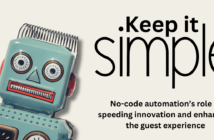Score big by improving how you train today’s hotel maintenance engineers
by DAN CLAPPER
Recruiting and preparing engineers for the job is one of the most painful challenges facing hotel management and leadership teams. And, the difficulty of retaining skilled engineers amplifies the problem. The disruption and churn associated with engineering recruiting and retention often serve as a roadblock to efforts that might alleviate the situation. Many companies have accepted that frequent turnover on their engineering teams – and the associated costs – are simply part of the business.
However, investing in an effective, repeatable maintenance-engineering training program, is a process that can deliver meaningful, real-world benefits in the hotel industry. Developing and implementing a training strategy can help companies streamline operations, enhance performance and productivity, ensure continuity, and ultimately boost customer satisfaction – and profitability.
Maximizing the results of a successful training strategy can produce short-term efficiency wins and lead to long-term performance gains that have a significant impact on a company’s bottom line and help differentiate them in a competitive marketplace.
TRAINING ROI
Here are six major benefits of effective hotel maintenance training.
1. Increased efficiency and performance:
Well-trained engineers can accomplish their tasks faster and more accurately. With more information and time, they also can conduct proactive, rather than reactive, maintenance, which drives uptime and can extend the life of your equipment.
2. Improved bottom line:
Effective training can allow you to contain capital costs and reduce outsourcing expenses. Employees will be able to diagnose issues correctly the first time and will be better able to make repairs instead of opting for replacing equipment such as appliances. Even if outsourcing is necessary, a well-trained employee can troubleshoot the problem and make a more informed decision about the suggested repairs an outside provider recommends.
3. Improved customer satisfaction:
With cross-trained and continuously upskilled engineers, your team can respond to service calls faster, decrease callbacks, and keep guests happy.
4. Higher employee morale and engagement:
Training can play a critical role in employee satisfaction. Creating career laddering programs (like aligning employee responsibilities to growth opportunities, for example) helps improve employee engagement and reduce turnover, which can prevent you and your business from being understaffed.
5. A competitive edge:
Younger generations increasingly are interested in career laddering and formalized in-house training programs that enable growth. With an effective training program in place, you’ll be able to broaden your candidate pool and reduce turnover with training designed to both upskill newer engineers and refresh experienced engineers.
6. Improved safety:
Safety training ensures your workers are protected in the field and reduces the number of incidents that occur. Workplace safety also helps improve productivity and reduce liability risks.
4 Elements Of Successful Training For Maintenance Engineers
Designing and successfully implementing in-house maintenance training can be a challenge for most hotel management leaders. Innovative digital training platforms, however, offer an easier path to effective training than ever before. Here are four features to look for.





